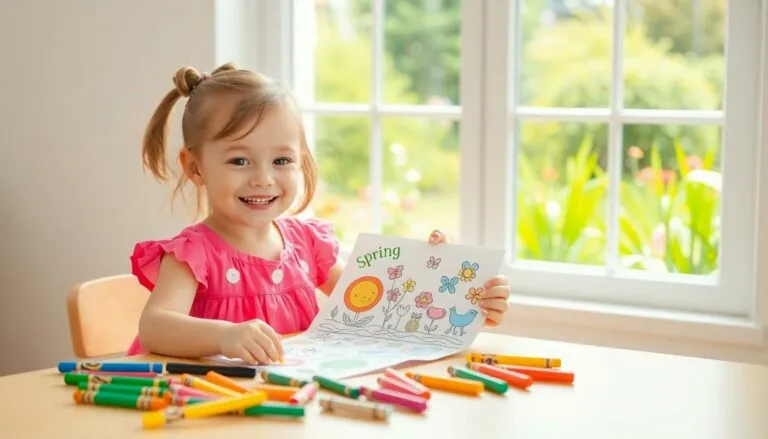Table of Contents
ToggleIn a world where toddlers can navigate screens better than most adults, parents often wonder how much TV is too much. With colorful cartoons and catchy songs vying for their little ones’ attention, it’s easy to let the TV become a digital babysitter. But before you hand over the remote, it’s crucial to understand the impact of screen time on a developing mind.
Experts suggest that moderation is key, but what does that really mean? Should toddlers be glued to the screen like a moth to a flame, or should they be encouraged to engage in real-world adventures? As we dive into the dos and don’ts of toddler TV time, you’ll discover the perfect balance that keeps your little ones entertained and their imaginations thriving—without turning them into couch potatoes.
Understanding Toddler Screen Time
Screen time for toddlers requires careful consideration. Parents must navigate guidelines that promote healthy viewing habits for young children.
Importance of Age-Appropriate Guidelines
Age-appropriate guidelines for screen time exist to support healthy development. The American Academy of Pediatrics recommends no screen time for children under 18 months, except for video chatting. Toddlers aged 18 to 24 months may watch educational content with parental guidance. For children aged 2 to 5, experts suggest limiting screen time to one hour per day of high-quality programming. Engaging in co-viewing can enhance understanding and retention. Parents should consider both content and duration to maximize benefits while minimizing risks.
Developmental Considerations
Developmental milestones significantly influence the impact of screen time. Toddlers learn through play and social interactions, making physical activity crucial. Television can promote learning but may hinder development if used excessively. Mental and social skills can suffer when screens replace real-world interactions. Encouraging hands-on activities, like reading or playing outside, fosters essential skills. Parents should ensure screens do not interfere with sleep schedules, physical activity, or family interactions. Balancing screen time with interactive play supports healthy growth and development.
Recommendations from Experts
Experts emphasize the importance of managing screen time for toddlers to support healthy development. Adhering to established guidelines can provide clarity for parents navigating this issue.
American Academy of Pediatrics Guidelines
The American Academy of Pediatrics encourages no screen time for children under 18 months. For toddlers aged 18 to 24 months, limited exposure to high-quality educational content is acceptable. Children aged 2 to 5 should have a maximum of one hour per day of high-quality programming. Co-viewing with caregivers enhances understanding and retention, helping toddlers make sense of what they see. Limiting screen time promotes healthier interactions and balances digital exposure with real-world experiences.
Other Notable Recommendations
Additional recommendations highlight the significance of quality over quantity. Choosing high-quality educational programming and avoiding passive viewing will yield the best results. Engaging toddlers in discussions about content fosters comprehension and critical thinking. Parents should prioritize activities that develop creativity, such as reading and imaginative play. Integrating screen time into a broader routine that includes physical activity ensures screens do not interfere with sleep or social interactions.
Potential Benefits of Limited Screen Time
Limited screen time can offer several advantages for toddlers, supporting their growth and development effectively.
Educational Content
Providing educational content can enhance a toddler’s learning experience. High-quality programming focuses on fundamental concepts, such as numbers and letters. Programs that promote problem-solving and critical thinking skills engage young minds. Parents encourage participation during viewing time, asking questions about the content. This interaction boosts comprehension and retention significantly. Limiting screen exposure to educational shows ensures toddlers benefit from positive learning experiences while minimizing distractions.
Family Bonding Opportunities
Watching television together creates valuable family bonding opportunities. Shared viewing encourages discussions about characters or storylines, helping strengthen family ties. Collaborating on understanding the content fosters deeper connections among family members. Parents can integrate related activities, such as crafts or games, that reinforce themes from shows. These collective experiences not only enhance enjoyment but also promote learning through playful interaction. Family time centered around screen activities enriches the overall experience, making moments more meaningful and memorable.
Risks of Excessive Screen Time
Excessive screen time poses serious risks for toddlers. Concerns about their development arise when screens replace interactive, hands-on learning.
Impact on Development
Screen time can impede critical developmental milestones. Young children rely on direct experiences to learn skills like language and social interactions. It reduces opportunities for imaginative play, which boosts creativity and cognitive function. Studies link higher screen exposure to delays in speech and language development. Active engagement in real-world activities fosters essential skills, and replacing playtime with screens can detract from this growth. Active play promotes motor skills and problem-solving abilities, highlighting the need for balance.
Behavioral Concerns
Behavioral issues often emerge with excessive screen time. Increased tantrums and difficulties in social situations can result from long hours in front of screens. Children may struggle with attention spans and exhibit signs of irritability or aggression. Research suggests connection between screen time and attention deficit behaviors. Reducing screen time can help mitigate these problems. Encouraging children to participate in physical activities or imaginative play fosters better emotional regulation and social skills. Engaging in real-life interactions diminishes potential negative effects from screens.
Strategies for Healthy Screen Time
Managing screen time for toddlers involves implementing effective strategies. Parents can create a structured approach that balances screens with other activities.
Creating a Balanced Schedule
Establishing a routine that includes specific times for screen use helps toddlers develop healthy habits. Schedule at most one hour daily for educational programming, as recommended by the American Academy of Pediatrics. Incorporate activities like reading, outdoor play, and family meals around screen time. Parents may consider using a visual timetable to help young children understand when it’s time for screens versus active play. Monitor the daily balance of screen time and other activities to ensure a well-rounded routine.
Choosing Quality Content
Selecting high-quality educational content is crucial for enriching a toddler’s experience. Focus on programs that promote learning, such as those emphasizing basic concepts, problem-solving, and creativity. Parents should opt for age-appropriate shows, ensuring content provides meaningful interactions. Engaging with the program while watching enhances comprehension and retention, creating opportunities for discussion and exploration. Take time to research and verify the educational value of shows before introducing them to toddlers. Quality truly outweighs quantity when it comes to screen time.
Conclusion
Finding the right balance for toddler screen time can be challenging. By adhering to established guidelines and prioritizing quality content, parents can ensure that screen time serves as a valuable tool for learning and development. Engaging with toddlers during viewing fosters understanding and strengthens family bonds.
Incorporating hands-on activities and outdoor play into daily routines promotes healthy growth while minimizing the risks associated with excessive screen exposure. Ultimately, creating a well-rounded schedule that emphasizes both educational programming and active play can support toddlers’ overall development and well-being.








